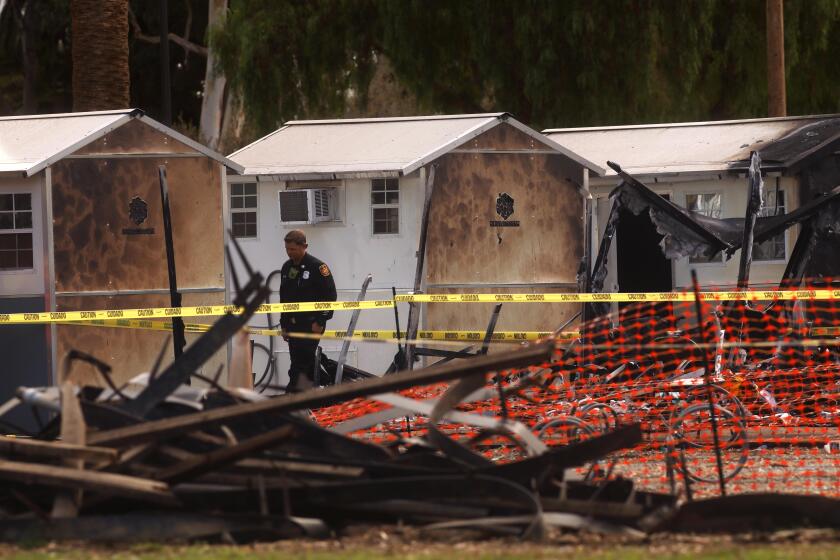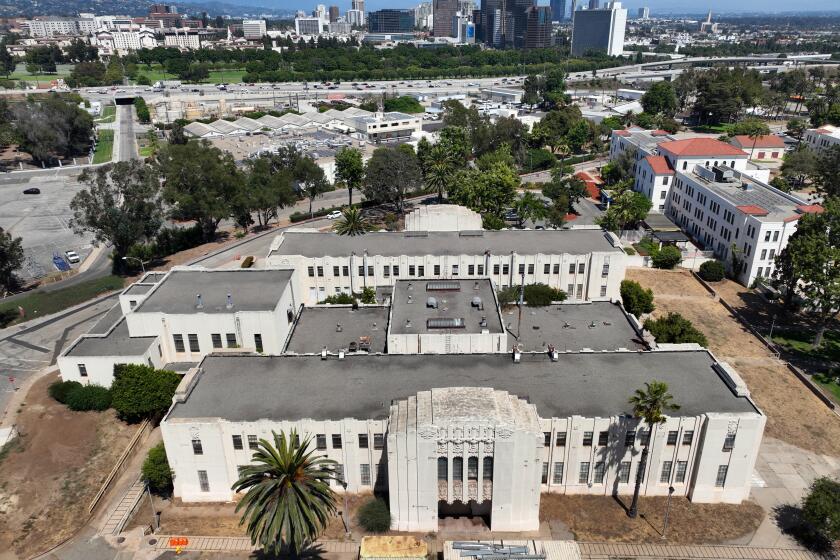Editorial: It shouldn’t take a judge to make VA house homeless vets

Since the U.S. Department of Veterans Affairs drew up a plan to build 1,200 units of housing for homeless veterans on its West Los Angeles campus to settle a lawsuit, progress has been appallingly slow. Eight years later, just 233 are open and an additional 535 are under construction.
But a new ruling in another lawsuit against the VA will hopefully jump-start the housing plan. U.S. District Judge David O. Carter ruled last week that the VA had failed Los Angeles County’s 3,000 homeless veterans by not building housing fast enough and by mishandling the sprawling 388-acre campus that was deeded to the government in 1888 to be a place where disabled veterans could live and thrive.
It shouldn’t have taken a judge to force the VA to do the right thing by homeless vets. But we appreciate that Carter ordered the VA to build 750 units of temporary housing on the campus in the next year and a half and come up with a plan in the next six months to build 1,800 units of permanent supportive housing for veterans. That’s on top of the 1,200 units the VA already is struggling to build. Additionally, Carter told the VA to build a town center with services and business, something veterans have long wanted. A court-appointed special master will monitor the progress and adjust the number of units of housing as needed.
A new lawsuit says the VA has miserably failed homeless veterans on its West Los Angeles campus.
Carter also ordered the VA to end its leases with UCLA — which uses the Jackie Robinson Stadium on the campus for its baseball games — and with the Brentwood School, a private school that has built extensive athletic facilities on 22 acres. Although those entities pay to be there, Carter made it clear that the leases are not for the benefit of the veterans — the criterion for everything on the campus.
The added units and the timeline may be a shock to the VA system — not to mention the two schools — but it’s a necessary step in shaking up the VA’s process. The details can be worked out later.
But it’s crucial that the federal government does not appeal this decision and waste more years waiting for an appellate court ruling. The VA should get building instead. Thousands of already vulnerable homeless veterans need housing now. They should not be living in tents, cars or even in temporary tiny houses that the VA has set up in the last few years. They served this country and deserve better.
U.S. District Judge David O. Carter castigated the VA for failing to use the 388-acre campus to ‘principally benefit veterans and their families.’
Some of the early delays were understandable. The VA had to undertake an enormous environmental study of the grounds and overhaul aging power, water, gas and telecommunications utilities to prepare for building a new residential community. Developers had to start the brutal process of cobbling together financing, including tax credits, that is necessary to build affordable housing. In the beginning that took up to a year and a half. Since then, developers have raised nearly $100 million in philanthropic funding.
In his ruling, Carter urges the VA to help find different, faster financing — including going to Congress to ask for funding. In fact, the VA did get more than $350 million in federal PACT Act funding, and should keep looking for more.
Let’s see what else the VA can do to speed up this process and finally get housing built. But first, the VA should accept the court’s ruling and comply.
More to Read
A cure for the common opinion
Get thought-provoking perspectives with our weekly newsletter.
You may occasionally receive promotional content from the Los Angeles Times.












